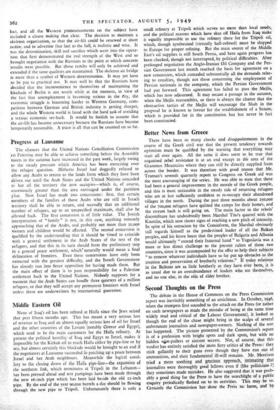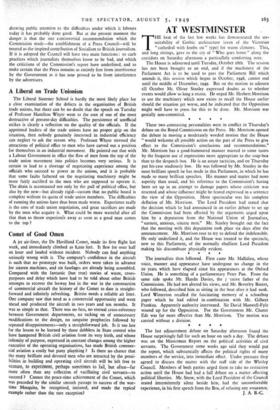Second Thoughts on the Press
The debate in the House of Commons on the Press Commission report was inevitably something of an anticlimax. In October, 1946, when the trumpets first sounded to the attack on the Press (or rather on such newspapers as made the mistake of being at the same time widely read and critical of the Labour Government), it looked as though the end of the chase might bring in the scalps of several unfortunate journalists and newspaper-owners. Nothing of the sort has happened. The picture presented by the Commission's report is of a profession with bright spots and dark spots, but with no hidden wire-pullers or sinister secrets. Not, of course, that this verdict has entirely satisfied the more fiery critics of the Press: they stick gallantly to their guns even though they have run out of
ammunition, and their fundamental remains. Mr. Morrison tried a more soothing and gracious approach, intimating that journalists were thoroughly good fellows even if (like politicians ?) they sometimes made mistakes. He also suggested that it was prob- ably a good thing for the Press to have the searchlight of a public enquiry periodically flashed on to its -activities. This may be so. Certainly the Commission has done the Press no harm, and by
drawing public attention to the difficulties under which it labours today it has probably done good. But at the present moment the danger is that the one controversial recommendation which the Commission made—the establishment of a Press Council—will be treated as the inspired contribution of Socialism to British journalism. If it is adopted the Council will have two main functions: to curb practices which journalists themselves know to be bad, and which the criticisms of the Commission's report have underlined, and to make certain that the Press remains as entirely free from interference by the Government as it has now proved to be from interference by the advertisers.



































 Previous page
Previous page